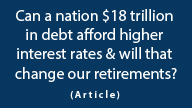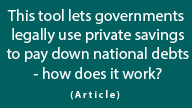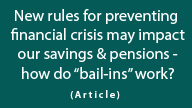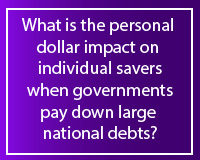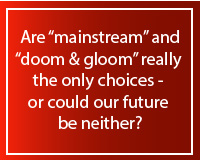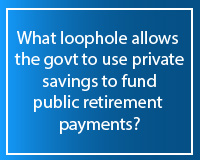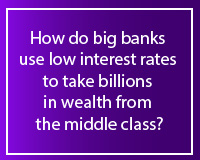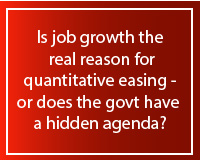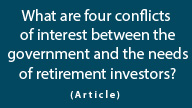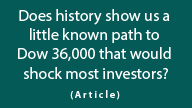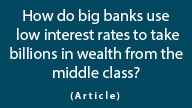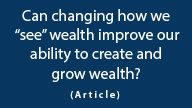Four Dangerous Paths: Wargaming The Greek Crisis From A Global Investment Perspective
by Daniel R. Amerman, CFA
Below is the 2nd half of this article, and it begins where the 1st half which is carried on other websites left off. If you would prefer to read (or link) the article in single page form, the private one page version for subscribers can be found here:
3) Grexit, Then Containment, Then Eventual Collapse Anyway
A third possibility, and potentially the deadliest of all, is that there is successful containment for an interim period, but then there is an eventual collapse anyway. Perhaps as a downstream result of what was set in motion by a Greek default/Grexit, but just as likely to be precipitated by another risk factor altogether – of which there are many in the world right now in both economic and geopolitical terms.
As explained here, many of the world's leading economists not only agree on the need to punish savers and cripple investment yields indefinitely as being the best way to fight "secular stagnation" (even if not phrased in those exact terms), but they also agree that there is a very dangerous potential side effect of these policies.
Which is that they can be predictably expected to create bubbles in financial markets.
Indeed, the defensive mechanisms which have been deployed since 2008 – and are likely to expand in the attempt to contain a potential Greece-induced crisis – could be called a perfect recipe for blowing a series of financial bubbles.
1. Create a lot of new money;
2. Make the money very cheap (low interest rates);
3. Remove the desirable high yield alternatives;
4. An upward price trend begins in a market, creating attractive price gains; and
5. Everybody piles into that market, looking for profits in a yield-starved world – and prices soar to new records.
By flooding the world economy with cheap and easy money, we've created some of the most richly valued securities markets in history in what's still otherwise a dysfunctional economic environment. And the more economically dysfunctional it gets – with a potential Grexit feeding into it – then for so long as the central banks maintain control, the higher that investment prices go, and the lower investor cash flow yields go.
Now if we have irrationally-priced markets and for some reason the central banks just slip for a moment (such as in the middle of a crisis), causing rational securities pricing to return along with fears of genuine risk – then the whole thing is prone to sudden collapse.
So there is the ongoing danger of bubbles popping, and this leaves investors in a losing situation that is three-fold:
1) During the period of containment, investors receive what are often negative yields in inflation-adjusted terms because of all this very cheap artificial money.
2) Of potentially equal or greater significance is that investors are also denied any form of risk premium for the heightened chances of global financial meltdown as a result of the bubbles that are being blown as a side-effect of the attempts to fight secular stagnation.
3) Investors are left with a steady creeping annual loss potentially for several years (or even a decade or more) until they reach the point where a bubble pops, the system can't handle it, and they take a truly major loss.
4) Capitulation & Contagion
There is a fourth alternative, which is that the Greek gamble – the threat to jump off the cliff – does work, and the Eurozone leaders negotiate a reduction in Greek debt payments that allows for higher wages, higher pensions and lower taxes.
Now again, this is likely to be enormously appealing to voters in other heavily indebted member nations that are looking at this. And it then paves the way for contagion, with an excellent chance that in 2015 or 2016 there will be another attempted major debt renegotiation, this time by a much larger and more economically significant country.
Which brings us back to our four unpleasant paths again.
If it were Spain first, and Italy is looking at both Greece and Spain, then the chances of Italy also going down that path are that much greater. Or, if Italy leads in following up on Greece's successful blackmail of the EU, then Spain can be expected to follow suit afterwards.
In either case, with each round there's an ever greater chance of financial collapse, or there is the prevention of collapse through an ever greater degree of – and longer-term program – of "negative real interest rates" that destroys retirement and other investment savings, and yet may be ultimately followed by financial collapse anyway.
(And there is the fifth alternative, which is that Greece backs down, with no material improvement in the terms of the bailout and therefore no distinct improvement in the standard of living of the average Greek. In other words, the government effectively tell Greece's voters: "about those election promises that were your reason for voting us into office in an electoral landslide, well, we were just kidding." This could happen, and possibly in a face-saving manner for the Greek government, but the premise of this article is to explore what may happen if it doesn't.)
The Investor Dilemma
The four potential paths explored pose an acute and fundamental dilemma for global investors. Which is that each path requires a quite different investment strategy, if one sticks to the traditional approaches to investing.
That is, those who feel financial meltdown is imminent and inevitable tend to opt for an all-in financial crisis investment strategy of the traditional sort.
But if that meltdown does not in fact occur, and the world heads down the second or fourth path instead – these investors will likely lose money on an ongoing basis.
That is because financial outcomes are very different during a long term period of artificially stable low yield markets than when crises are actually taking down markets, as we've already seen with precious metals investment results over these last few years.
And how does the conventional stock and bond approach handle this ongoing environment of negative yields and no risk premiums that are imposed as a matter of policy by central banks around the world?
When it comes to these traditional long-term retirement investment strategies – what all four paths have in common is that they shred them.
There is either a collapse scenario which potentially wipes out decades of savings, or in the case of artificial stability there is a slow and steady squeeze that reduces the spending power of those portfolios in inflation-adjusted terms year after year.
How is it possible then for an investor to achieve financial security?
There are solutions, but they require a non-traditional investment approach.
The first step is to understand and indentify what is going on, and then learn about the unconventional strategies that can succeed in any one of these four future environments.
 What you have just read is an analysis about just one of the ways in which a rapidly shifting world is removing the foundations beneath conventional investing - even while most investors continue to follow the traditional strategies, unaware of just how much the financial playing field has changed.
What you have just read is an analysis about just one of the ways in which a rapidly shifting world is removing the foundations beneath conventional investing - even while most investors continue to follow the traditional strategies, unaware of just how much the financial playing field has changed.
 A personal retirement "eye-opener" linked here shows how the government's actions to reduce interest payments on the national debt can reduce retirement investment wealth accumulation by 95% over thirty years, and how the government is reducing standards of living for those already retired by almost 50%.
A personal retirement "eye-opener" linked here shows how the government's actions to reduce interest payments on the national debt can reduce retirement investment wealth accumulation by 95% over thirty years, and how the government is reducing standards of living for those already retired by almost 50%.
 An "eye-opener" tutorial of a quite different kind is linked here, and it shows how governments use inflation and the tax code to take wealth from unknowing precious metals investors, so that the higher inflation goes, and the higher precious metals prices climb - the more of the investor's net worth ends up with the government.
An "eye-opener" tutorial of a quite different kind is linked here, and it shows how governments use inflation and the tax code to take wealth from unknowing precious metals investors, so that the higher inflation goes, and the higher precious metals prices climb - the more of the investor's net worth ends up with the government.
 Another "eye-opener" tutorial is linked here, and it shows how governments can use the 1-2 combination of their control over both interest rates and inflation to take wealth from unsuspecting private savers in order to pay down massive public debts.
Another "eye-opener" tutorial is linked here, and it shows how governments can use the 1-2 combination of their control over both interest rates and inflation to take wealth from unsuspecting private savers in order to pay down massive public debts.







If you find these "eye-openers" to be interesting and useful, there is an entire free book of them available here, including many that are only in the book. The advantage to the book is that the tutorials can build on each other, so that in combination we can find ways of defending ourselves, and even learn how to position ourselves to benefit from the hidden redistributions of wealth.


